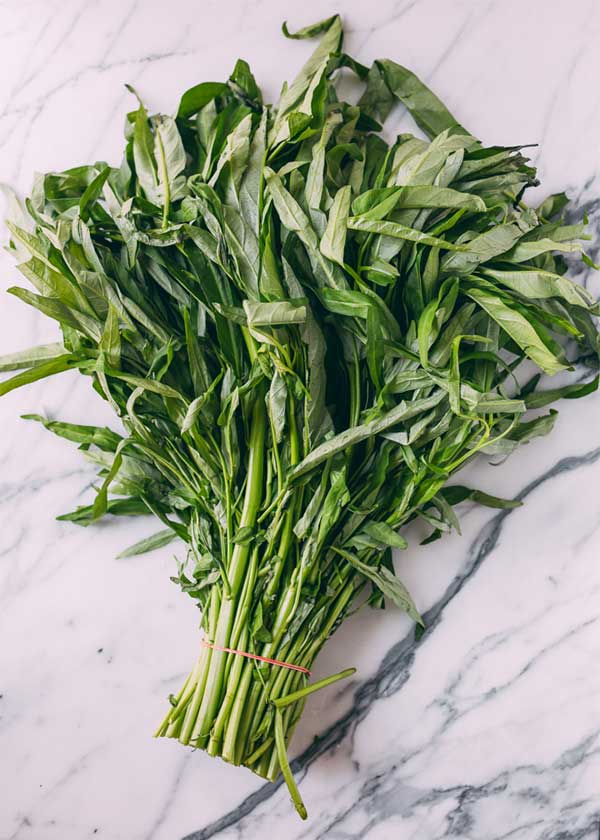Water Spinach Now Legally Sold in Georgia After Decades of Prohibition, But Still Not Allowed to be Grown.
At the end of March, the ban on water spinach in Georgia was lifted after many decades. Water spinach is now permitted to be imported from other states and sold within the state, but regulations regarding its cultivation are still under consideration.
As an important food item in Asian cuisine, water spinach has been banned in several states in the U.S. due to its high invasiveness. Water spinach requires moist soil to thrive and can grow as rapidly as weeds. It was banned in the 1970s because it was considered harmful to native plants, according to the U.S. Department of Agriculture.
Originating from China, water spinach is grown in India, Malaysia, Africa, Brazil, the Caribbean, and Central America, and is popular in the cuisines of many Asian countries such as China, Vietnam, Malaysia, Singapore, and Thailand. As the Asian community migrated to the U.S., the demand for this vegetable increased.
Growing water spinach does not take much time; it only requires water and moist soil. The shoots of water spinach can grow up to 10 cm each day, making it difficult to control and posing risks such as obstructing waterways, damaging water pipes, gutters, or flood control channels. Additionally, water spinach is seen as creating a breeding ground for mosquitoes, disrupting ponds and lakes, and harming native plants, especially in humid subtropical climates like Georgia and Florida.
Due to the robust growth of water spinach, Southern states like Florida, Texas, and Georgia have strict regulations on managing this vegetable. In Florida, water spinach must be grown in greenhouses, harvested, and packaged on-site before transportation. According to the Fish and Wildlife Conservation Commission, residents cannot grow water spinach in ponds, lakes, rivers, or canals.

Water spinach can be grown easily in other countries but faces obstacles in the U.S. (Photo: The Woks of Life).
The movement against the ban on water spinach began over 10 years ago when Hong Kong Supermarket in Georgia collected signatures to petition lawmakers to lift the ban on import and sale in the state. Since then, the Asian population in Georgia has increased by 52%. Before the ban was lifted, they had some “workarounds”. Although it was illegal to grow and sell in stores, water spinach could still be purchased in other locations like cars, churches, parking lots, and nail salons.
Jenny Vo, the Vietnamese American Executive Director of City Farmers Market and Hong Kong Supermarket, noted that the black market price for water spinach at that time could reach up to $22 per kg, three times the normal price in other states. “When you went to a restaurant and wanted to eat water spinach, you had to ask very carefully, like: ‘Do you have that dish?’ You had to go through a challenge just to enjoy a type of vegetable,” she said.
Mr. Ben Vo, who represented the petition and is Jenny Vo’s father, argued that if appropriate regulations were applied, water spinach would become a low-risk plant.
Ms. Le Dam Doan, a member of the Asian Pacific American Council and the Vietnamese American community in the state, recounted her surprise when she moved to Lawrenceville in 2004 and learned that water spinach was considered an illegal product in Georgia. “They treated water spinach like marijuana,” Ms. Doan recalled.

Stir-fried water spinach with garlic is a familiar dish in many Asian countries. (Photo: Oh My Food Recipe).
A bill introduced by Representative Pedro Marin in 2016 aimed to remove water spinach from the “noxious weeds” list, receiving community support but was later withdrawn. The effort to “save” water spinach continued in 2022 when Georgia’s Agricultural Commissioner Gary Black successfully advocated for allowing restaurants to serve water spinach. Previously, a petition had garnered 100,000 signatures since 2016.
“After reviewing pest risk analyses from the U.S. Department of Agriculture and Texas along with my staff and talking with other states, we believe water spinach can be safely sold in Georgia. We encourage stores and restaurants to only purchase water spinach from reputable sources with valid permits to transport it across state lines,” Commissioner Black stated.
Currently, growing water spinach is still not allowed in Georgia. When sold, water spinach is cut very close to the root to ensure no part of the root is left when customers take it home, ensuring they cannot grow it again. However, authorities are studying regulations expected to be announced by the end of the year, allowing the cultivation of water spinach under a permit from the state agricultural commission. If approved, Georgia will be the fifth state in the U.S. to allow the cultivation of this vegetable under strict conditions, following California, Florida, Hawaii, and Texas. Water spinach is now publicly sold in grocery stores in Georgia for $6 per kg, much cheaper than before.





















































